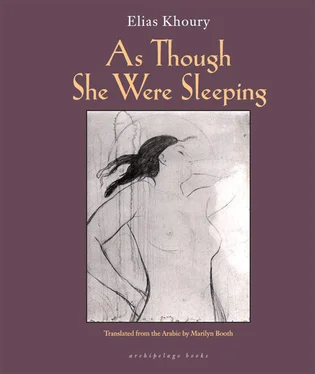There was another element she could not forget. Ever since her mother’s illness, cooking had begun to enter the warp and woof of her dreams. She would be mincing onions for laban immuh and suddenly Niqula and Abdallah would appear in front of her, Niqula in his jaunty tarbush and Abdallah wearing the sandals that he never took off, summer or winter. The two young men would be conversing about a visit they had made to the home of an Assyrian wizard called Dr. Shiha. He had come from Iraq and was calling people to a new religion that blended Islam with Christianity. Abdallah talked vividly about the new faith while Niqula made fun of it; the wings of onion turned into little birds; and Milia was fast asleep.
Milia knew that these two kinds of dreams were not particularly important. Even so, many a time she could not keep herself from taking them seriously. This led to her morning problem, which was a matter of persuading her body to acclimatize to moving through air rather than water. Dreams were akin to water; it was as though she swam the waters of her eyes. But she did not dare to tell this to anyone. Moreover, these two dream realms overlapped and ran into each other. An entry-dream that pervaded you with the first spreading numbness of sleep would come back to meet the end-dream that prefaced wakefulness, the door behind which one must shake off the waters of darkness and come out onto dry land. In her waking moment the two worlds fused into a single horizon clouded in fuzzy darkness. The prewaking dream picked up features from the entry-dream of the previous night such that Milia could no longer distinguish between the two. Getting out of bed, she would trace footsteps of the two dreams and behave in a way that those around her could not possibly comprehend.
What does one say to Najib? Should she have told him that she saw him in her dream embracing a plump woman under the lilac tree, while the woman caressed him and flirted with him and rubbed her fleshiness against his chest? Najib told her she was crazy and she believed his innocence. She would stop attaching her dreams to her life, she decided then and there. And then the dead birds came and laid everything bare.
The third sort was the deep dream. In these dreams she saw the dead creatures and knew everything about that woman whom Najib had married. In the first two classes of dreams Milia never saw herself. She would see others, but it was only in the deep dream that she saw her own image reflected in the mirror of the night. This was a dream that did not float to the surface: she had to dive into the depths of herself in search of it. There she would encounter the brown-skinned girl with the greenish eyes who scampered down the alleys of the night and concealed her dreams in a dark and cryptic hollow. Milia became accustomed to not telling this sort of dream to anyone because it was not really in her possession. It belonged to that girl whose form she inhabited, and with whom she flew, traversing the arcs of the night, before everything faded and broke up into fragments.
The birds occupied the deep dream. There, inside a forest of stone pine that rose to the skies, Milia saw herself. The small brown girl stood beneath a towering pine that threw its shade across the scene, though under the hot sun the taste of copper burned her lips and tongue. Without warning she saw him. Najib wore the uniform of a French soldier and darted through the trees as if he were fleeing from her. She waved both hands at him to make him stop. He was running like a blind man, colliding into the trunks of trees. She stood there not daring to move. It was fear that paralyzed her. Flocks of birds filled the vacant sky and eventually blocked out the sun. They looked like sparrows but they flew with a peculiar swiftness, bumping into each other and dropping, folding their wings and falling dead. The earth filled with death. Najib vanished and little Milia stood alone beneath a sun assailed by dark clouds, and the tiny feathered creatures were dying. The girl’s feet would not move; she saw herself spreading her arms and falling. She wanted to scream to Najib to come and save her but her voice choked in her throat and he was gone. The heart of the little bird who had folded his wings trembled but he did not plunge hard to the ground. The earth cracked open to make a series of valleys that moved apart, and the little bird was suspended in emptiness.
Milia opened her eyes. She was thirsty. She put out her hand for the glass of water next to her bed. It was empty. She took it to her lips and drank the thirst and the emptiness. She thought about getting up to fetch some water but she was afraid. Her feet were half paralyzed. She put her head down on the pillow and begged sleep to come. It came as waves of tingling and numbness and she saw the birds again. Najib was standing next to her holding her hand. Suddenly he let go of it and went into the tree. The trunk of an enormous sycamore tree split into two and swallowed him. The smell of graves and burials rose to spread across the scene. The little brown girl stood barefoot, pebbles digging painfully into the soles of her feet. The birds came. They spread their wings to fly and dropped, they were falling, and Milia grew smaller and smaller until she was no larger than a mote of dust.
She opened her eyes and heard herself panting with fear and understood that it was the end. Najib’s birds had died and it was over. When she heard the news from her mother she felt no surprise. Her almond eyes held a look of repose. It doesn’t matter, she said, and ran off to the kitchen to make the kibbeh nayye that the family ate every Sunday at midday.
That had happened one year before she met Mansour. It was a difficult year because repeatedly she had to chase away the little airborne bodies that floated surreptitiously from her deep dream into her shallow dream. She began seeing the birds in the morning, but without any trees. Before the birds could retract their wings in anticipation of death, Milia would open her eyes and jump out of bed and head for the garden. She would put her mouth under the water tap in the little pond and drink and drink, getting her chest and nightgown wet. This morning ablution was her way of purifying herself from the filth of death, memories of the trees, and the disappearance of Najib.
How could she talk about these things? How could she strip away her dreams and tell the story to Mansour? How could she make him understand that a person must divest himself of words in order to be capable of divesting himself of clothes? And that dreams cannot be washed away except by water?
Milia’s story with marriage could be labeled many things. A lone girl lives with her widowed mother and her four brothers. The mother is afflicted with an obscure, nameless illness. The girl had to transform herself into mistress of a home when she was eleven. Saadeh did not go to the doctor. The sum total of medications she would resort to was a morsel of cotton soaked in the oil she carried home from the Church of the Archangel Mikhail. She would come home from the church and make the cotton into shapes that looked something like pills, which she would swallow after every meal. After Yusuf’s death, Saadeh became a nun in all but name — though a nun without a convent. She also timed her prayers to the tolling of the church bell — that never seemed to stop ringing, as it announced the nuns’ canonical prayers, which took up a goodly portion of the day. She rose at four o’clock for the morning prayers. She ate her breakfast and crawled back into bed as her illness took over. At eleven o’clock she reverted to prayer, performing that of the Sixth Hour, and when that was over she sat in her room waiting for the lunch Milia would have prepared. Her afternoon nap was over by five o’clock when she prayed Vespers before having her supper and saying her Soothoro prayers before she slept.
Читать дальше












